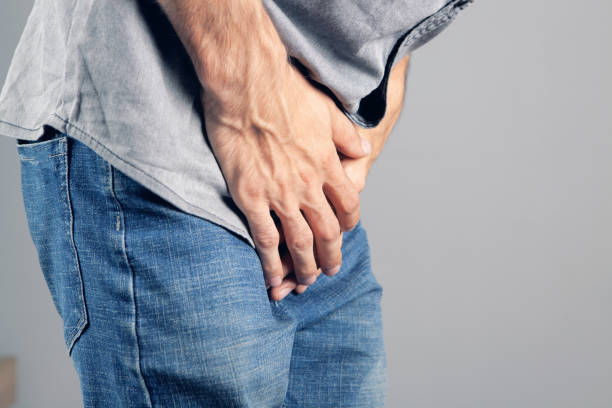
STIs are the most common and dangerous infectious diseases. The World Health Organization (WHO) estimates that everyday, more than 1 million STIs are acquired by people worldwide. The risk of spreading or contracting an STI is high and remains a threat to public health due to the fact that STIs are mostly transmitted through sexual contact, which is a universal and rampant act. The risk becomes even higher if you have multiple sex partners, sexual intercourse with a person who has multiple sex partners, or sex without condoms.
Every sexually active man is at risk of contracting a sexually transmitted infection (STI). STIs can have long-term health complications if left untreated. It is important to know the sexually transmitted infection symptoms in men, as early treatment can help prevent most of the complications.
STIs are the most common and dangerous infectious diseases. The World Health Organization (WHO) estimates that every day, more than 1 million STIs are acquired by people worldwide.
The risk of spreading or contracting an STI is high and remains a threat to public health because STIs are mostly transmitted through sexual contact, which is a universal and rampant act. The risk becomes even higher if you have multiple sex partners, sexual intercourse with a person who has multiple sex partners, or sex without condoms. In this article, we will be looking at the most common sexually transmitted infection symptoms in men and how to prevent them.
Sexually transmitted infections (STIs), also referred to as sexually transmitted diseases (STDs), are the infections you get from having any form of sexual activity with an infected person. It can be passed through vaginal sex, oral sex, anal sex, and skin-to-skin contact.STIs can spread from person to person through body fluids such as blood, sperm, vaginal discharge, and even breast milk.
Some STIs are not only transmitted through sex but also through other physical contact with bodily fluids, such as the sharing of needles, kissing, blood transfusions, and from a mother to her unborn baby. STI is a serious health condition that requires medical attention. Undiagnosed and untreated STIs can affect sexual and reproductive health, resulting in infertility and sterility as well as becoming a threat to life.

Sexually transmitted infection symptoms in men depend on the type of STI a man has. The symptoms can manifest within a few days or weeks, but sometimes they do not appear until months or even years later. It is important to note that some infected men may not be aware that they are infected because they look healthy and do not experience any STI symptoms. However, having no symptoms does not mean the infection is not affecting their health.
The most common sexually transmitted infection symptoms in men include:
STIs are grouped into three types: bacterial, viral, and parasitic. According to the WHO, more than 30 different bacteria, viruses, and parasites cause sexually transmitted diseases. Bacterial STIs are STIs caused by bacteria, such as chlamydia, gonorrhoea, and syphilis, Viral STIs are caused by viruses transmitted during sexual activity, e.g., Human papillomavirus (HPV), hepatitis A and B, herpes, and HIV. Parasitic STDs are caused by parasites, e.g. Trichomoniasis and scabies.
READ:
Safe Sex Practices and Sexual Responsibility
The complications of STIs can be minor or life-threatening.
Some minor complications include:
Serious and life-threatening complications can result from undiagnosed or untreated STIs. They include:
A physical examination by a doctor, a blood test, or a culture of the secretions from the penis are the main ways to diagnose most STIs.
Treatment for STDs depends on whether the cause of the STI is bacterial or viral. Bacterial STIs, like chlamydia, gonorrhoea, or syphilis, can be treated with the use of antibiotics. Viral STDs cannot be cured, but some, such as herpes, can be managed. Herpes can be managed with antiviral medications like valacyclovir and acyclovir.
There is no treatment formally approved for Human papillomavirus (HPV), but it can be prevented with the HPV vaccines, Gardasil and Cervarix. Additionally, medication can be applied to treat the genital warts, or they can be removed surgically.
There is currently no known cure for HIV. If you are at risk of contracting HIV, your doctor may prescribe a pre-exposure prophylaxis (PrEP) pill for you. The pill can help fight HIV if it enters your body and treats any of its symptoms or complications. If you are already infected with the HIV virus, antiretroviral therapy can reduce the amount of virus, prevent the virus from progressing to AIDS, and reduce the risk of transmission to others.
Abstaining from sex is the only sure way to prevent STIs. If you must engage in sexual activity, you can reduce your risk of contracting an STI by
Use condoms when having sex. Always use condoms even while having oral and anal sex. You can also use a dental dam, also known as a rubber dam or an oral condom when engaging in oral sex. Do not share needles. Do not use unsterilized needles or piercing needles with other people.
Sexually Transmitted Infections (STIs) if left untreated can lead to serious complications in your health such as infertility, liver damage, PID, cancer and even more infections. Don’t wait until it’s too late.
Get the right diagnosis and treatment from expert doctors on KompleteCare without visiting the hospital. Discuss your symptoms via audio or video consultation, and receive the right prescription from the comfort of your home or office.
Save time and money
Guaranteed privacy & confidentiality
Convenience.Talk to a doctor today.
Sexually transmitted infection symptoms in men are more common than we can think and equally damaging. Telemedicine can be a powerful tool for men who might be experiencing symptoms of sexually transmitted infections (STIs).
One of the biggest benefits is privacy. Many men feel embarrassed or uncomfortable discussing STI symptoms in person. With telemedicine, they can talk to a doctor from the comfort of their own home. This means they don’t have to worry about bumping into someone they know at a clinic or hospital.
Another advantage of telemedicine is convenience. Sometimes, men might ignore symptoms because they are too busy to go to a doctor’s office. They can schedule an appointment with telemedicine at a time that works for them, even outside of regular office hours. They can also avoid the hassle of travelling and waiting in a crowded waiting room, which makes it easier to get help sooner rather than later.
Lastly, telemedicine can provide quicker access to treatment. After discussing their symptoms with a healthcare provider online, men can often get prescriptions sent directly to their local pharmacy. This speedy process helps start the treatment sooner, which is crucial for sexually transmitted infection symptoms in men.
Early treatment not only helps alleviate symptoms faster but also prevents the infection from spreading to others. Overall, telemedicine makes it easier, faster, and more comfortable for men to take care of their sexual health. With telemedicine, sexually transmitted infection symptoms in men needn’t be an enduring challenge.
Sexually transmitted diseases (STDs) are caused by sexually transmitted infections (STIs) and they spread mainly through sexual contact. However, STIs are transmitted from person to person through bodily fluids like blood, vaginal fluid, or semen. The causes of STIs include parasites, bacteria, or viruses.
STDs like herpes and HIV infection, cannot be cured and persist throughout life. However, STDs caused by bacteria (like syphilis, chlamydia, and gonorrhoea) and one parasitic STIs (trichomoniasis) are curable with single-dose regimens of antibiotics.
Currently, gonorrhea has the strongest resistance to drugs, making it the hardest STD to treat. Gonorrhea (caused by the bacterium Neisseria gonorrhoeae) has historically been treatable with antibiotics. However, over time, gonorrhea developed resistance to many of the once effective antibiotics. This antibiotic resistance has made gonorrhea one of the most challenging STDs to treat.
The most harmful STD is the Human Immunodeficiency Virus (HIV) and this virus can lead to Acquired Immunodeficiency Syndrome (AIDS).
Sexually transmitted infection symptoms in men usually have no noticeable symptoms. However, sexually transmitted infection symptoms in men typically include discharge, bleeding, painful blisters, pain when urinating or during sex, burning sensation or itching in the penis, and more.
Mayo Clinic (2023) Sexually transmitted diseases (STDs) – Symptoms and causes
Urology Care. Sexually Transmitted Infections
Healthline (2023) Sexually Transmitted Disease (STD) Information for Men
World Health Organization. Sexually Transmitted Infection – Learn about common STIs
healthcareNovember 7, 2024
MedicationNovember 25, 2024
NutritionFebruary 5, 2025
MedicationFebruary 5, 2025








